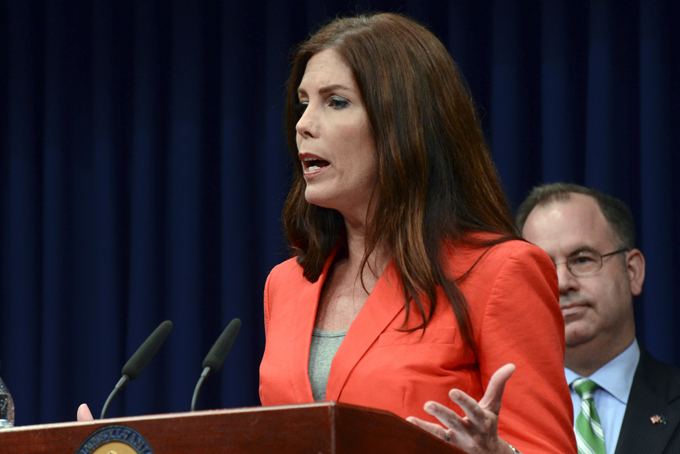
HARRISBURG, Pa. (AP) — UPMC has agreed to allow some Highmark insurance customers to continue using its doctors and facilities at in-network rates under an agreement announced Friday after a bitter fight between the two western Pennsylvania health care giants.
Gov. Tom Corbett and Attorney General Kathleen Kane, whose offices were instrumental in negotiating the deal in a dispute that has roiled western Pennsylvania, announced the deal in a joint Capitol news conference with officials from the two companies.
In particular, people undergoing treatment, needing access to unique services or in an area with relatively little health care competition would fall into protected categories.
A contract between the two companies ends Jan. 1. As a result, most Highmark subscribers will lose in-network access to UPMC doctors and hospitals after Dec. 31, meaning they will pay higher rates. Highmark said Friday that a small fraction of its 3.2 million insurance subscribers in western Pennsylvania will be affected.
Fewer than 10 percent of Highmark’s enrollees had used a University of Pittsburgh Medical Center doctor or facility in the last year, the insurer said.
Some details remain under negotiation, but state officials stressed the deal would ensure that crucial health care decisions remain in the hands of doctors and patients after the inevitable split.
“The focus had to be truly on putting the patients first, the people of western Pennsylvania, the consumers,” Corbett told the news conference.
Kane called the settlement a “first step in a long process to ensure health care security in western Pennsylvania” that averted a lengthy court battle.
The expectation is that commercial insurers will blitz the Pittsburgh metropolitan area in a marketing effort that touts their in-network access to UPMC.
UPMC is western Pennsylvania’s dominant network, with 22 hospitals and 400 outpatient sites. However, it has complained that Highmark is now a competitor, since the insurer recently acquired seven area hospitals from Erie to Pittsburgh called the Allegheny Health Network, and it refused to extend the insurance contract with Highmark.
Under the agreement, doctors can keep patients who are in the midst of a course of treatment in network at UPMC for as long as necessary. That includes times when the doctor believes the patient needs cancer treatment or a particular service that is not available from another source.
Other Highmark enrollees will be able to keep their doctors for a year if they cannot find an alternative without being billed extra.
Two of UPMC’s specialty hospitals, Children’s Hospital and Western Psychiatric Institute and Clinic, will remain in-network to Highmark subscribers because they are the only institutions of their kind in the Greater Pittsburgh area. The agreement, however, does not include Magee-Womens Hospital, Pittsburgh’s pre-eminent center for obstetrical services and gynecologic care.
Hospitals outside the greater Pittsburgh area — UPMC Bedford, UPMC Venango, UPMC Hamot in Erie and Altoona — will remain in-network. Emergency and trauma services will continue to be accessible at in-network rates even at UPMC’s metropolitan Pittsburgh hospitals, although the companies have not negotiated an agreement on that subject yet.
People who are 65 or older, or are covered by Medicare, Medicaid or the state’s Children’s Health Insurance Program will not be affected.
Highmark had been given a July 1 deadline by the state Department of Insurance to say whether it could extend the contract with UPMC or not.
Corbett’s administration had not pressed the companies to extend their contract. Rather, he had insisted that the split not force any patient in the midst of treatment to find a new doctor or force anyone to travel farther for hospital care.
Still, some lawmakers, consumer groups and labor unions had raised public pressure on UPMC to renew a contract with Highmark, and warned of the impact on people who will need to find a new doctor.
“It’s harder to switch (insurers) than people think it is,” said Ruth Anne Ford, a mother of four who lives in Herman, about 30 miles north of Pittsburgh. “Highmark is the only insurance offered through my husband’s company and I don’t see them changing anytime soon.”